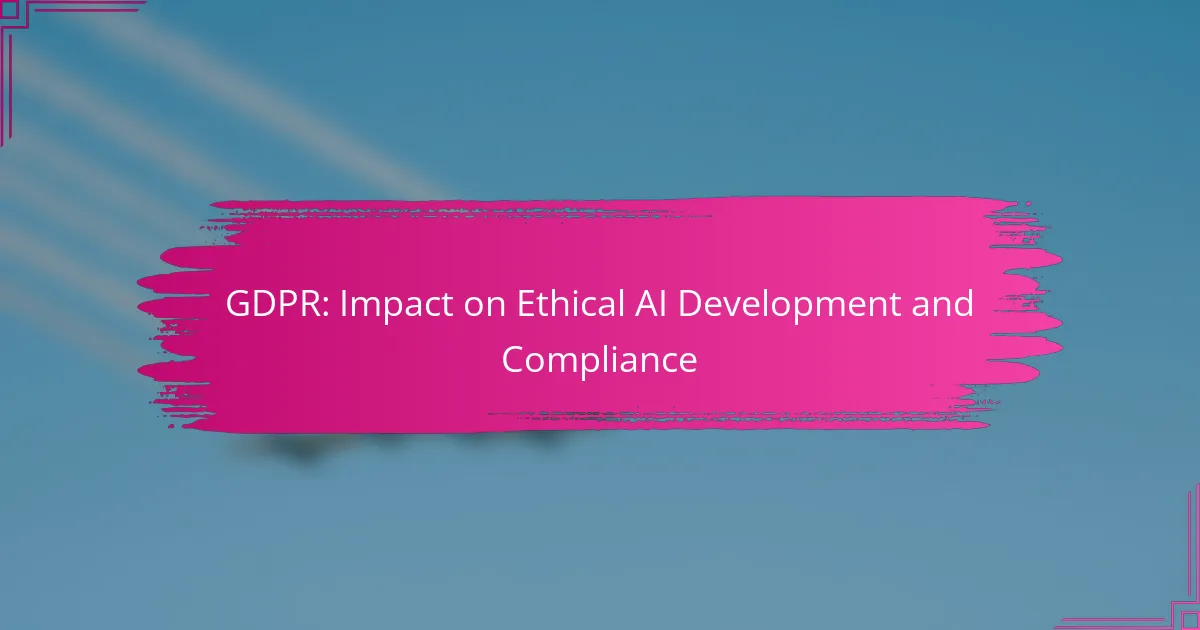The General Data Protection Regulation (GDPR) plays a crucial role in shaping ethical AI development by establishing stringent data protection standards and accountability measures. Organizations must prioritize user privacy and incorporate ethical considerations into the design of AI systems, ensuring compliance with key requirements such as data minimization and consent management.

You can learn more in GDPR and Ethical AI.
How Does GDPR Affect Ethical AI Development?
The General Data Protection Regulation (GDPR) significantly influences ethical AI development by imposing strict data protection standards and accountability measures. These regulations require organizations to prioritize user privacy and ensure that AI systems are designed with ethical considerations in mind.
Data protection requirements
GDPR mandates that organizations collect and process personal data only when necessary and with explicit consent. This means AI developers must implement data minimization strategies, ensuring that only essential data is used for training algorithms. Additionally, data must be stored securely and protected against unauthorized access.
Organizations should regularly conduct data protection impact assessments (DPIAs) to evaluate risks associated with AI systems. This proactive approach helps identify potential vulnerabilities and ensures compliance with GDPR requirements.
Accountability in AI systems
Under GDPR, accountability is crucial for AI systems, requiring developers to establish clear lines of responsibility for data handling. Organizations must designate data protection officers (DPOs) to oversee compliance and address any breaches. This accountability fosters trust and encourages ethical practices in AI development.
Furthermore, companies should implement robust governance frameworks that outline procedures for monitoring AI systems and addressing any ethical concerns that arise during their operation.
Transparency obligations
GDPR emphasizes the need for transparency in AI systems, requiring organizations to inform users about how their data is collected, processed, and used. This includes providing clear explanations of AI decision-making processes and the logic behind algorithmic outcomes.
To enhance transparency, organizations can adopt measures such as user-friendly privacy notices and accessible documentation that outlines AI functionalities. This helps users understand their rights and fosters a culture of accountability.
Impact on algorithmic bias
GDPR’s focus on fairness and non-discrimination directly impacts how AI systems are developed to avoid algorithmic bias. Developers must ensure that training datasets are representative and do not perpetuate existing biases, which can lead to unfair treatment of certain groups.
Regular audits and bias assessments should be conducted to identify and mitigate any discriminatory outcomes in AI systems. This practice not only complies with GDPR but also promotes ethical AI development.
Compliance challenges
Meeting GDPR requirements can pose significant challenges for AI developers, particularly regarding data management and accountability. Organizations may struggle with the complexities of obtaining user consent and ensuring data protection throughout the AI lifecycle.
To navigate these challenges, companies should invest in training for their teams on GDPR compliance and ethical AI practices. Developing a clear compliance strategy and leveraging technology for data management can also streamline the process and reduce risks associated with non-compliance.

What Are the Compliance Requirements for AI Under GDPR?
AI systems must adhere to several compliance requirements under the General Data Protection Regulation (GDPR) to ensure ethical use of personal data. Key areas include data minimization, consent management, the right to explanation, and conducting impact assessments.
Data minimization principles
The data minimization principle mandates that organizations collect only the personal data necessary for their AI systems to function effectively. This means limiting data collection to what is essential for the intended purpose, thereby reducing the risk of misuse.
For example, if an AI model is designed for customer service, it should only gather information relevant to customer inquiries rather than extensive personal details. Regular audits can help ensure compliance with this principle.
Consent management
Consent management is crucial for AI systems that process personal data. Organizations must obtain clear and informed consent from individuals before collecting their data, ensuring that users understand what their data will be used for.
Implementing user-friendly consent forms and providing options to withdraw consent easily can enhance compliance. It is essential to keep records of consent to demonstrate adherence to GDPR requirements.
Right to explanation
The right to explanation allows individuals to understand how decisions affecting them are made by AI systems. Under GDPR, users can request information about the logic involved in automated decision-making processes.
Organizations should develop clear communication strategies to explain AI decisions in accessible language, helping users grasp how their data influences outcomes. This transparency fosters trust and aligns with ethical AI practices.
Impact assessments
Conducting Data Protection Impact Assessments (DPIAs) is a requirement for AI systems that pose high risks to individuals’ privacy. DPIAs help identify and mitigate potential risks associated with data processing activities.
Organizations should implement DPIAs early in the AI development process, focusing on data handling practices and potential impacts on user rights. Regularly updating these assessments can ensure ongoing compliance and risk management.

What Are the Best Practices for Ethical AI Development?
Best practices for ethical AI development focus on integrating ethical considerations throughout the AI lifecycle. This includes ensuring compliance with regulations like GDPR, prioritizing user privacy, and fostering transparency in AI systems.
Implementing privacy by design
Privacy by design is a fundamental principle that requires integrating privacy measures into the development process from the outset. This approach ensures that data protection is a core component of the AI system rather than an afterthought. For instance, developers can use data anonymization techniques to protect user identities while still allowing for meaningful analysis.
To effectively implement privacy by design, organizations should conduct thorough risk assessments during the design phase. This helps identify potential privacy risks and allows for the incorporation of mitigation strategies early on.
Regular audits and assessments
Conducting regular audits and assessments is crucial for maintaining compliance with ethical standards and regulations like GDPR. These evaluations help identify vulnerabilities in AI systems and ensure that data handling practices align with established privacy policies. Organizations should schedule audits at least annually, but more frequent assessments may be necessary depending on the complexity of the AI systems.
During audits, it is essential to review data usage, access controls, and compliance with user consent protocols. This proactive approach can prevent potential breaches and enhance trust among users.
Stakeholder engagement
Engaging stakeholders, including users, regulators, and industry experts, is vital for ethical AI development. This collaboration fosters transparency and allows for diverse perspectives on ethical considerations. Organizations should establish channels for feedback and dialogue to ensure that stakeholder concerns are addressed throughout the AI lifecycle.
To facilitate effective stakeholder engagement, companies can organize workshops or forums where users can share their experiences and expectations regarding AI systems. This input can guide the development process and help align AI solutions with societal values and needs.

What Tools Can Help Ensure GDPR Compliance in AI?
To ensure GDPR compliance in AI development, organizations can utilize various tools designed to manage data privacy and ethical considerations. These tools help streamline processes, maintain transparency, and mitigate risks associated with personal data handling.
Data governance platforms
Data governance platforms are essential for managing data assets and ensuring compliance with GDPR regulations. They provide frameworks for data classification, access control, and data lineage tracking, which are crucial for understanding how personal data is used within AI systems.
When selecting a data governance platform, consider features like automated data discovery, policy enforcement, and audit capabilities. Popular options include Collibra and Informatica, which help organizations maintain compliance while enhancing data quality and security.
Compliance management software
Compliance management software assists organizations in monitoring and managing their adherence to GDPR requirements. These tools typically offer features such as risk assessments, compliance tracking, and reporting capabilities to ensure that AI systems operate within legal boundaries.
Look for software that integrates with existing data systems and provides real-time compliance updates. Tools like OneTrust and TrustArc are designed to help organizations streamline their compliance efforts and reduce the risk of penalties associated with GDPR violations.
AI ethics frameworks
AI ethics frameworks guide organizations in developing AI systems that align with ethical standards and legal requirements. These frameworks emphasize principles such as fairness, accountability, and transparency, which are vital for GDPR compliance.
Implementing an AI ethics framework involves assessing the ethical implications of AI models and ensuring that data usage respects individual rights. Frameworks like the European Commission’s Ethics Guidelines for Trustworthy AI can serve as a valuable resource for organizations aiming to build responsible AI solutions.
You can explore more about these principles in ethical AI regulatory frameworks.
